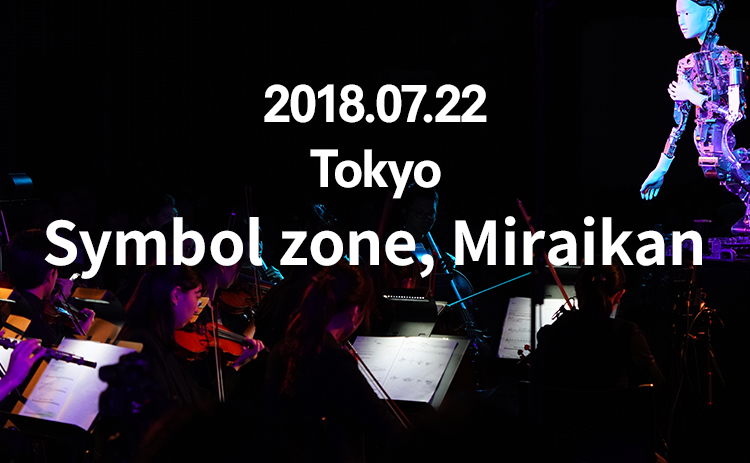Past performance

Android Opera “Scary Beauty” world premier at The National Museum of Emerging Science and Innovation (Miraikan) , July 22, 2018
We are Apt to Overlook and Forget it.
− About the World Premiere of “Scary Beauty”
Frankly speaking, the creation and preparation of the performance was extremely difficult. Or perhaps I should say I was struck by the thought that I might not be able to realize it over and over again. There were some reasons for the difficulty.
An android equipped with a pneumatic system is not suited for delicate movements like a conductor. There are some customs between conductor and orchestra, but making the android learn them, it is nothing more than just an inferior version of a human conductor. Originally, an orchestra is consisted of a large number of players and it needs a lot of rehearsals. If a performance is played by computers, we can connect the android with computers directly and control it by sending various signals. This time, I composed music simulating in computers, orchestrated it and transcribed the data into paper scores, then our orchestra and I practiced and updated it time after time.
So why did I set the difficulty voluntarily?
On the way home from a rehearsal in National Museum of Emerging Science and Innovation, Takashi Ikegami, in charge of developing programs for the android, said that he still remembered my words on a radio program, “I will compose an opera with an android”, after the performance “THE END” in Paris, 2013. Just as he said, the origin of the project dates back to 2013 in Paris. For these 5 years, I have bided my time to realize it although it has been on the verge of being called off many times. An android opera has become a part of me. I have thought over it and researched around it. My reading has been occupied with searches for texts that the android sings in the opera.
Setting a complex challenge becomes a power for works when it is accomplished. It means that I dare not set a technology-oriented subject. I don’t bring ideas from the things we can do in the present. Neither my works nor I can survive if the reach of my imagination is based on the current technologies.
It was extremely hard to develop the conduct of android and to cooperate with it and orchestra. In the process developing, layering and correcting programs many times over, we reached a subject. “What do humans sense as rhythm? − as heartbeat? ”
Itsuki Doi(researcher of Ikegami Laboratories), Motoharu Kawashima(musician of Contemporary Music), Kotobuki Hikaru (musician), Takashi Ikegami, and I kept playerless rehearsals for the android over and over, staying overnights for several days.
As a result, we arrived at a conclusion: “The repetitiveness of up-and-down movements on android’s shoulder and waist, like human breathing makes communication between android and orchestra go much more smoothly; rather than focusing on the movements on its arms and hands.”
Actually, in rehearsals after that, many members of the orchestra started taking off their earphones and saying, “I might be able to play under the android’s conduct without clicking rhythm.” In fact, they were playing more freely under its conduct.
It is also a general subject. It means that developing programs and giving autonomy for android are not all humans can do. In the process playing with android, human orchestra can explores and finds the way to play under the conducts entirely different from humans. We are apt to forget it.
Human orchestra can understand and play with the conductor of android responding each other. A Scary Beauty − something quite different from the original meaning, I named firstly − was coming out there. I got the feeling that the distance between android and humans became close somewhat at that moment.
And now, we back to the words Motoharu Kawashima was said by a young member of the orchestra, when he explained the project to them at the very beginning; “How do we play with a conductor no breathing?” We are breathing and responding to each other. It’s only natural but we are apt to overlook and forget it.
After these rehearsals, I decided to take infinite repetition of the human breath sounds generated by computers, in my new opera work “On certainty”(text by Ludwig Josef Johann Wittgenstein). Just to not only see the artificial breaths but also to hear it. I hope that it will bring about a bit of liberty for android and humans.
P.S.
I think the performance is incredible that it might be handed down to later years. It is neither a festival, nor a sponsored program, nor a commissioned work. There is the madness we just seek possibilities under a lot of difficulties, gathering around an android and cooperating each other. I will give the madness to everyone. And I think here it is about art. I am extremely grateful to all the staffs, all the members of orchestra, and the Android “Alter 2”, for overcoming the madness and limit with me.
18 July 2018
Keiichiro Shibuya
